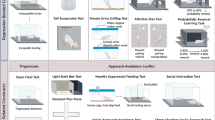Abstract.
Rationale: Despite prolonged abstinence, prior drug dependence is accompanied by lasting changes in physiology, psychosocial functioning and vulnerability to relapse. One proposed mechanism for these alterations is dysregulation of corticotropin-releasing factor (CRF) neurocircuitry. Objectives: To determine regional brain CRF content and HPA-axis activity during protracted cocaine and ethanol withdrawal in dependent rats. Methods: To study protracted ethanol withdrawal, rats (n=22) were fed a nutritionally complete, ethanol (10% v/v) liquid diet for 3–4 weeks. Controls (n=12) were pair-fed an isocaloric, ethanol-free formulation. To study protracted cocaine withdrawal, rats (n=23) self-administered cocaine (0.25 mg/infusion; FR-5) daily for 3 weeks during 3-h sessions and subsequently were allowed to self-administer cocaine during two 12-h "binge" sessions. Controls (n=6) received yoked saline infusions. Regional brain CRF-like-immunoreactivity (CRF-LI), plasma ACTH-LI and CORT-LI levels were determined from 1 day to 6 weeks post-withdrawal. Results: Both ethanol- and cocaine-withdrawn rats initially exhibited reduced CRF-LI content in the amygdala followed by a progressive increase culminating in elevated levels 6 weeks post-withdrawal. Ethanol-withdrawn rats also initially had reduced hippocampal, frontal cortical and hypothalamic CRF-LI levels and time-dependent reductions in basal CORT levels. Cocaine-withdrawn rats showed time-dependent elevations in frontal cortical CRF-LI and basal CORT levels. Conclusions: Protracted withdrawal from ethanol or cocaine is associated with altered limbic CRF-LI and circulating CORT levels beyond the detoxification stage. The delayed nature of some changes suggests that they may not represent residual effects of acute withdrawal, but rather emerging manifestations of a separate process, such as allostatic load.
Similar content being viewed by others
Author information
Authors and Affiliations
Additional information
Electronic Publication
Rights and permissions
About this article
Cite this article
Zorrilla, E.P., Valdez, G.R. & Weiss, F. Changes in levels of regional CRF-like-immunoreactivity and plasma corticosterone during protracted drug withdrawal in dependent rats. Psychopharmacology 158, 374–381 (2001). https://doi.org/10.1007/s002130100773
Received:
Accepted:
Issue Date:
DOI: https://doi.org/10.1007/s002130100773




